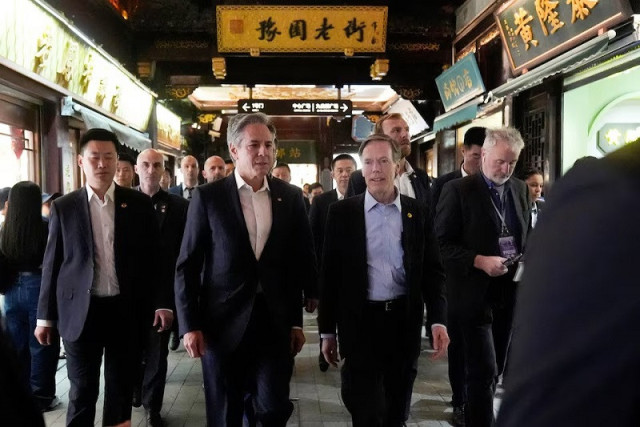Better US-China ties but still deep disagreements as Blinken starts visit
US Secretary of State to meet business leaders before talks in Beijing with FM Wang Yi and likely meeting President Xi

US Secretary of State Antony Blinken arrived in Shanghai on Wednesday with US-China ties on a steadier footing, but with a daunting array of unresolved issues threatening the stability of relations between the global rivals.
Blinken will meet with business leaders before heading to Beijing for talks on Friday with his counterpart, Foreign Minister Wang Yi, and a likely meeting with President Xi Jinping.
Blinken's visit is the latest high-level contact between the two nations that, along with working groups on issues from global trade to military communication, have tempered the public acrimony that drove relations to historic lows early last year.
But Washington and Beijng have made little headway on curbing China's supply of chemicals used to make fentanyl, Taiwan remains a flashpoint, and strains are intensifying over China's backing of Russia in its war in Ukraine.
While significant progress is unlikely during the visit, both countries want "open lines of communication to avoid awkward scenarios," said Alfred Wu, associate professor at the Lee Kuan Yew School of Public Policy in Singapore.
Read also: US Secretary of State Blinken to visit China
Blinken will press China to stop its firms from retooling and resupplying Russia's defence industrial base. Moscow invaded Ukraine in February 2022, just days after agreeing a "no limits" partnership with Beijing, and while China has steered clear of providing arms, US officials warn Chinese companies are sending dual-use technology that helps Russia's war effort.
Without providing details, a senior State Department official briefing reporters on Friday said Washington was prepared to "take steps" against Chinese firms it believes are damaging US and European security.
The United States has preliminarily discussed putting sanctions on Chinese banks over the country's support for Russia, but officials told Reuters they do not yet have a plan to do so.
Washington has so far stopped short of sanctioning major Chinese banks – long deemed by analysts as a "nuclear" option – because of the effects it could have across the global economy and on US-China relations.
A Chinese foreign ministry official quoted by state news agency Xinhua on Tuesday said relations "have shown a trend of stopping decline and stabilising," since Biden and Xi met in San Francisco in November.
But the official criticised what they called Washington's "stubborn strategy of containing China, and its erroneous words and deeds of interfering in China's internal affairs, tarnishing China's image and undermining China's interests."
Call for 'restraint' over Taiwan
The visit also comes after the US Congress moved ahead this weekend with a bill that includes new funding for Taiwan and less than a month before the democratically governed island inaugurates a new president, Lai Ching-te, who, like his predecessor, rejects China's claim to the island.
The senior State Department official said parties should "avoid taking provocative actions that may raise tensions, and demonstrate restraint" ahead of the inauguration. "That will be our message going forward," the official added.
An effort to force China's ByteDance to sell the social media app TikTok or face a ban in the US is also gaining steam in Congress, a sign of the growing appetite in Washington to confront Beijing on economic issues.
Blinken is also expected to raise human rights, including China's treatment of Muslims in its western Xinjiang region.
Other US officials have met or called their Chinese counterparts recently as part of the broader US effort to keep lines of communication open.
Treasury Secretary Janet Yellen was in Beijing and the southern factory hub of Guangzhou earlier this month, and last week Defense Secretary Lloyd Austin spoke with his Chinese counterpart for the first time in 18 months.
Read: US, Chinese defence chiefs hold first talks since 2022
Biden's national security adviser Jake Sullivan has also held regular talks with Wang, aiming as the administration says, to responsibly manage competition between the two powers.
Despite the tensions there have been attempts to find common ground on issues such as the Middle East conflict.
After an alleged Israeli strike on an Iranian consular facility in Damascus earlier this month, Blinken spoke with Wang, as well as with representatives of other countries with ties to Iran, "to make clear that escalation is not in anyone's interest, and that countries should urge Iran not to escalate," a State Department spokesperson said on April 11.
Wang Huiyao, founder and president of the Beijing-based think tank Center for China and Globalization, told Reuters that contact showed the potential of the two countries working together.
"They sell all their oil to China," Wang said of Iran, "so when China says, 'OK, you just stop,' then they have to think about it."



















COMMENTS
Comments are moderated and generally will be posted if they are on-topic and not abusive.
For more information, please see our Comments FAQ